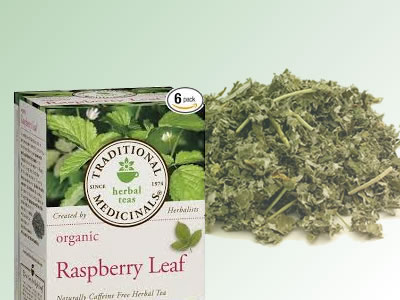Raspberry leaf tea is used to help menstrual cramps and pregnancy in women.
Raspberry is the fruit of a perennial plant in the genus Rubus. The fruit is edible, red or black. Raspberries are now widely grown as a commercial fruit crop in the world for the fresh fruit and juice market.
Raspberries contain significant amounts of vitamin C, manganese and dietary fibre. Raspberries also contain vitamins B 1-3, folic acid, magnesium, copper and iron. Raspberry is one of the top fruits for antioxidant strength. It has an ORAC value (oxygen radical absorbance capacity) of about 4900 per 100 grams, much higher than apple’s average 2800. The rich contents of polyphenol antioxidants such as anthocyanin pigments in raspberries have potential health protection against several human diseases. It is believed that phenolics and flavonoids in raspberries are antioxidant and antiproliferative (chemopreventive) which have effects against cancer.
While raspberry is considered as a healthy fruit, red raspberry leaf is used as a herb medicine that is beneficial to women’s health.
Benefits of red raspberry leaf tea
Raspberry leaf herbal tea is used by Native Americans to soothe colds, sore throats and canker sores, aid digestive problems and help childbirth.
Red raspberry leaf tea can help treating women’s problems and improving women’s reproductive health. Red raspberry leaf tea is said to relieve menstrual cramps and regulate irregular menstruation.
Red raspberry leaf tea helps women in pregnancy, childbirth, breastfeeding and infertility. Raspberry leaf is a tonic. The nutrients in the leaves can help tonify and improve the health of the uterine lining, increase the blood flow to women’s reproductive organs. It strengthens the muscles of the uterus, prevents miscarriage, and helps women to have easier childbirth and faster labor. It is also beneficial to breastfeeding women by increasing breast milk.
Drinking red raspberry leaf tea can help women in pregnancy to enhance the fertility and reduce risk of miscarriage. Raspberry leaf tonifies women in pregnancy, reducing morning sickness, strengthening the mother’s body, boosting the mother’s immune system, and helping the baby to develop its skin and bones properly. It also promotes healing and allows the mother’s body to recover more quickly after childbirth.
How to make a raspberry leaf tea
Red raspberry leaf tea is available in the health supplement market. It is sold in pre-packaged tea bags. You may also find dried raw leaves in bulk herb form. It is simple to make a raspberry leaf tea. The taste of the leaf tea is somewhat bitter, similar to black tea. You can add sugar or honey for a sweeter taste.
Recipe 1: raspberry leaf tea for women’s health
– Dried raspberry leaves 1-2 tea bags (or 10 grams of dried leaves)
– Boiling water 1 cup
– Steep for 15 minutes
– Add sugar, honey or lemon to taste
– Drink it, 2-3 times a day
Recipe 2: raspberry leaf ginger tea for morning sick
– Dried raspberry leaves 2 teaspoons
– Fresh ginger (diced) 1 teaspoon
– Brown sugar 1 teaspoon
– water 1 cup
– Bring to a boil and simmer for 2 minutes
– Strain and add the sugar
– Drink it warm
Recipe 3: raspberry leaf cinnamon tea for menstrual cramps, fertility
– Dried raspberry leaves 2 teaspoons
– Cinnamon powder 1 dash
– Brown sugar 1 teaspoon
– Boiling water 1 cup
– Put the leaves, cinnamon and sugar in a cup
– Pour boiling water over it
– Steep for 15 minutes
– Strain and remove the leaves
– Drink it warm, twice a day
Warnings
Generally speaking, raspberry leaf tea is safe. Most women say it is helpful. But there were a few women who reported that they had the worst menstrual cramps and pelvic muscular pain after taking the tea.
Please Note: Raspberry leaf may lower blood sugar levels, so diabetics should avoid it. Although it is useful for pregnancy, a woman in pregnancy should still consult a doctor before using raspberry leaf tea.
References
- Lipophilic and hydrophilic antioxidant capacities of common foods in the United States, Wu X, Beecher GR, Holden JM, Haytowitz DB, Gebhardt SE, Prior RL, 2004, J. Agric. Food Chem. 52 (12): 4026–37.
- Antioxidant activity and antimicrobial effect of berry phenolics—a Finnish perspective, Heinonen M. 2007, Mol Nutr Food Res 51 (6): 684–91.



